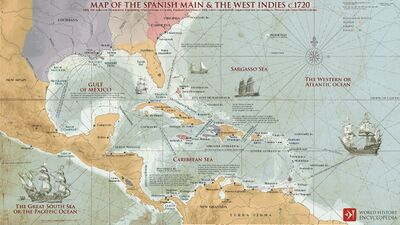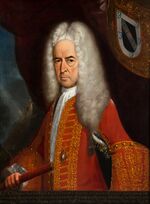Difference between revisions of "Category:Viceroyalty of New Spain"
| (9 intermediate revisions by the same user not shown) | |||
| Line 1: | Line 1: | ||
| − | <p>See [https://en.wikipedia.org/wiki/New_Spain Wikipedia]</p> | + | [[File:1720treasurefleet-2k.jpg|400px|right]]<p>See [https://en.wikipedia.org/wiki/New_Spain Wikipedia]</p> |
| − | <p> | + | <p>The Viceroyalty of New Spain was the name of the viceroy-ruled territories of the Spanish Empire in North America and its peripheries in Asia from 1521 to 1821. New Spain was the name that the Spanish gave to the area that today is central and southern Mexico, and since the capital city of the Viceroyalty was in Mexico City, the name was also used for the viceroyalty.</p> |
| − | <p>The | + | <p>The Viceroyalty of New Spain's territory included what is the Bay Islands (until 1643), Cayman Islands (until 1670), Central America (as far as the southern border of Costa Rica until 1821), Cuba, Florida, Hispaniola (including Haiti until 1700), Jamaica (until 1670) Mariana Islands, Mexico, Philippines, Puerto Rico, nearly all of the southwestern United States (including all or parts of the modern-day U.S. states of California, Nevada, Utah, Colorado, Wyoming, Arizona, New Mexico, Texas and Florida). Spain claimed areas as far north as British Columbia and Alaska, but the northern boundary of New Spain was redefined by the Adams-Onís Treaty of 1819. New Spain also included Venezuela before it was annexed to the [[:Category:Viceroyalty of New Granada|Viceroyalty of New Granada]] in 1717.</p> |
| + | <p>The territories were separated into provinces. Provinces were led by a governor, who was responsible for the administration of the province and often also led the province's army and militias. The provinces were grouped together under five high courts, called Audiencias in Spanish, at Santo Domingo, Mexico City, Guatemala, Guadalajara and Manila. Both the high courts and the governors had autonomy from the viceroy and carried out most duties on their own. Only on important issues did the viceroy become involved in ruling the provinces directly. </p> | ||
| − | [[Category:SeaDogs]][[Category:Locations (Sea Dogs)]] | + | =Government= |
| + | [[File:Juan de Acuña.jpg|right|thumb|150px|Juan de Acuña]]37th Viceroy of New Spain (since 15 Oct 1722): [https://en.wikipedia.org/wiki/Juan_de_Acu%C3%B1a,_1st_Marquess_of_Casa_Fuerte Juan de Acuña, 1st Marquess of Casa Fuerte] | ||
| + | *[https://en.wikipedia.org/wiki/Captaincy_General_of_Cuba Captaincy-General of Cuba]/Governorate of Havana (since 29 September 1724): [https://es.wikipedia.org/wiki/Dionisio_Mart%C3%ADnez_de_la_Vega Don Dionisio Martínez de la Vega] | ||
| + | **Governorate of [https://en.wikipedia.org/wiki/Spanish_Florida la Florida] | ||
| + | **Governorate of Santiago de Cuba | ||
| + | *[https://en.wikipedia.org/wiki/Captaincy_General_of_Guatemala Captaincy-General of Guatemala] | ||
| + | *[https://en.wikipedia.org/wiki/Captaincy_General_of_the_Philippines Captaincy-General of the Phillipines] | ||
| + | *[https://en.wikipedia.org/wiki/Captaincy_General_of_Puerto_Rico Captaincy-General of Puerto Rico] | ||
| + | *[https://en.wikipedia.org/wiki/Captaincy_General_of_Yucat%C3%A1n Captaincy-General of Yucatán]: Currently between governors—last was Antonio Cortaire y Terreros, out (for reasons?) in 14 Dec 1724 | ||
| + | |||
| + | [[Category:SeaDogs]][[Category:Locations (Sea Dogs)]][[Category:Spain]] | ||
Latest revision as of 09:17, 20 February 2023
See Wikipedia
The Viceroyalty of New Spain was the name of the viceroy-ruled territories of the Spanish Empire in North America and its peripheries in Asia from 1521 to 1821. New Spain was the name that the Spanish gave to the area that today is central and southern Mexico, and since the capital city of the Viceroyalty was in Mexico City, the name was also used for the viceroyalty.
The Viceroyalty of New Spain's territory included what is the Bay Islands (until 1643), Cayman Islands (until 1670), Central America (as far as the southern border of Costa Rica until 1821), Cuba, Florida, Hispaniola (including Haiti until 1700), Jamaica (until 1670) Mariana Islands, Mexico, Philippines, Puerto Rico, nearly all of the southwestern United States (including all or parts of the modern-day U.S. states of California, Nevada, Utah, Colorado, Wyoming, Arizona, New Mexico, Texas and Florida). Spain claimed areas as far north as British Columbia and Alaska, but the northern boundary of New Spain was redefined by the Adams-Onís Treaty of 1819. New Spain also included Venezuela before it was annexed to the Viceroyalty of New Granada in 1717.
The territories were separated into provinces. Provinces were led by a governor, who was responsible for the administration of the province and often also led the province's army and militias. The provinces were grouped together under five high courts, called Audiencias in Spanish, at Santo Domingo, Mexico City, Guatemala, Guadalajara and Manila. Both the high courts and the governors had autonomy from the viceroy and carried out most duties on their own. Only on important issues did the viceroy become involved in ruling the provinces directly.
Government
37th Viceroy of New Spain (since 15 Oct 1722): Juan de Acuña, 1st Marquess of Casa Fuerte
- Captaincy-General of Cuba/Governorate of Havana (since 29 September 1724): Don Dionisio Martínez de la Vega
- Governorate of la Florida
- Governorate of Santiago de Cuba
- Captaincy-General of Guatemala
- Captaincy-General of the Phillipines
- Captaincy-General of Puerto Rico
- Captaincy-General of Yucatán: Currently between governors—last was Antonio Cortaire y Terreros, out (for reasons?) in 14 Dec 1724
Subcategories
This category has the following 3 subcategories, out of 3 total.
Pages in category "Viceroyalty of New Spain"
The following 4 pages are in this category, out of 4 total.

